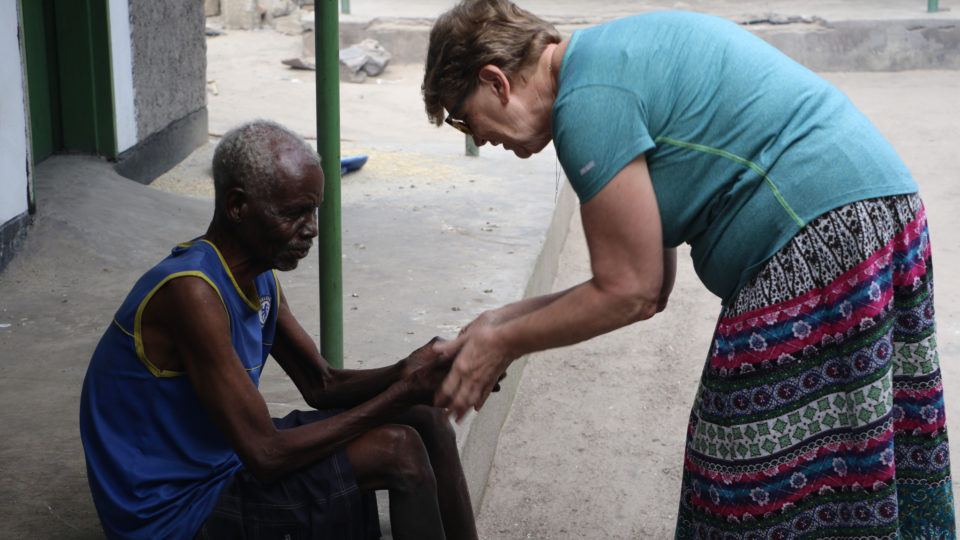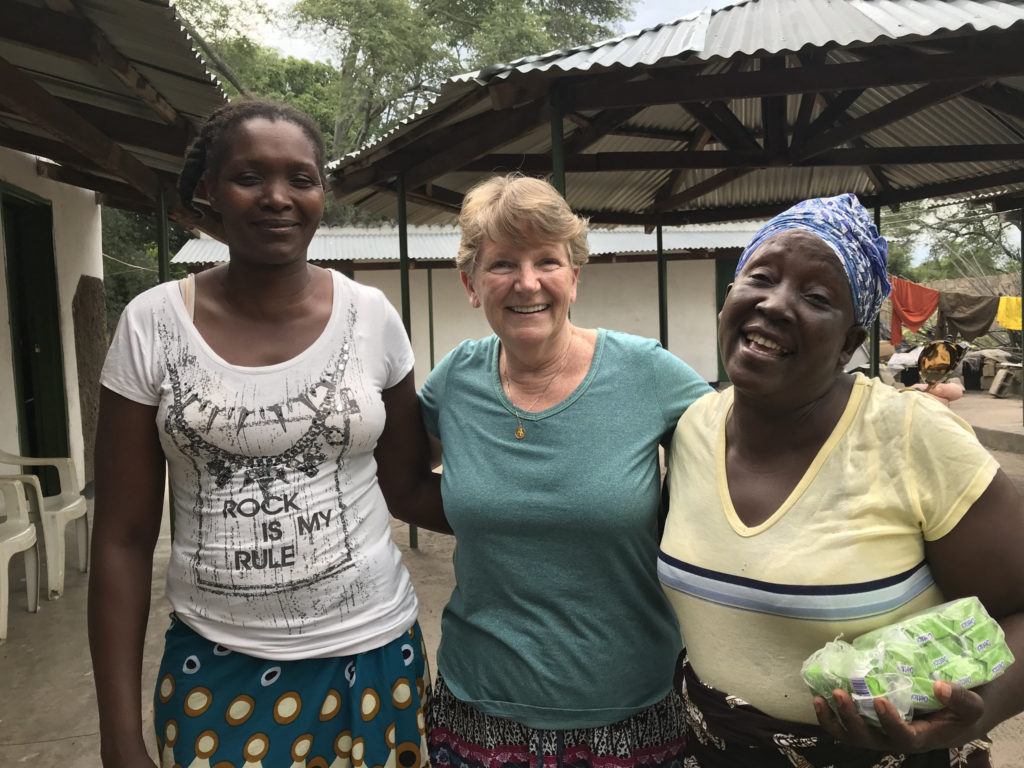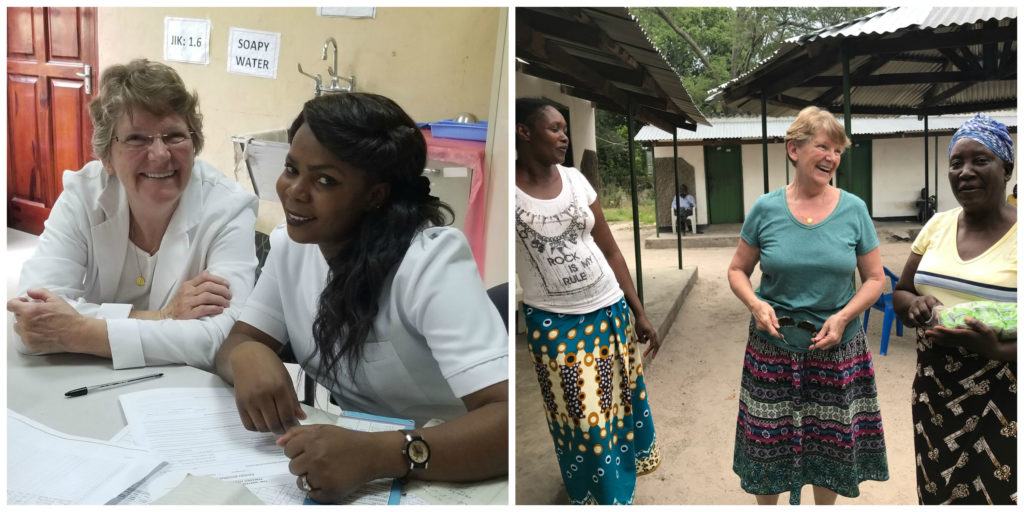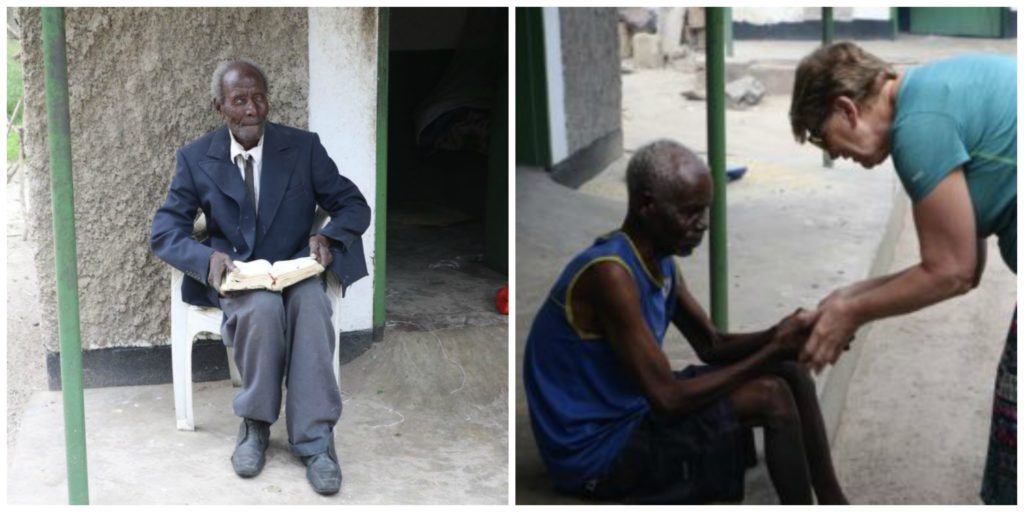Words of Wisdom: A Conversation with Beverly Farinelli

Beverly Farinelli is a nurse and hospital administrator from Pittsburgh, PA. She has twice been named humanitarian of the year – a title she’s earned for her unwavering commitment to making the world a better place.
We are lucky to have her as part of our team of international volunteers. She has twice served with medical mission trips to Mwandi and more recently, traveled to the Nuba Mountains of Sudan where she supported a team at the Mother of Mercy Hospital (where one of our favorite volunteers, Dr. Tom Catena, has been serving for over a decade). Through these experiences with CMMB, she has been able to live out a dream she’s had since she was a young girl – to visit and serve in Africa.
How has your work as a nurse, tied into your experience on a mission trip?
My passion is taking care of people. Anyone who is in pain or suffering is in need of another person’s hand to hold. When I do mission work, it’s not about the expertise of being a super clinician or project manager but, about bringing human touch to people who are lonesome and forgotten – people who just really need someone to help lift them up from their suffering.
You worked and supported staff in hospitals on both of your mission trips? What words would you use to sum up your experience as a volunteer nurse in these settings?
Awesome. My word is awesome. I was in awe to see how much people endure with so little. I realized the gratitude and appreciation of what it means to reach out and touch somebody. It’s not about your ego, your stuff, or the expertise you bring. It’s being able to look into a person’s eyes and say – I am here with you, and I’m going to help you. That help may only be ten seconds of holding them, stroking their face, or touching their baby. But, the light in their eyes that comes out when they see that you’re sincere, is awe-provoking. That is awesome.
What lesson would you draw from your experiences working at hospitals like the ones in Mwandi and the Nuba Mountains?
The lesson I would draw is ultimately one of gratitude. When I walk away from situations like the ones I saw in Mwandi or the Nuba Mountains, I feel really guilty that I didn’t do more. But, despite this feeling of walking away, I remain grateful for the ability to serve someone who otherwise would not be served.
Were there any experiences from your time as a volunteer that have impacted you or that you will always remember?
Well It’s very hard to choose just one – there is no way anyone can go to a place like Mwandi or the Nuba Mountains and have just one moment that impacted you. This being said, I can think of one moment from my time in Mwandi that seems to stand out at the moment.
One day, we went to Kandiana to take care of this woman who had been bitten by a snake. Basically, Kandiana is a part of the hospital in Mwandi, it is home to disabled adults. It is home to individuals that maybe don’t have family, whose families have rejected them, or whose families couldn’t take care of them. These people have lived there the majority of their lives. When we were there, Katherine the main carer for these people, and a woman who I very much admire came up to me. I asked her, “Katherine will you be my sister? I don’t have a sister, so will you be my sister?”And she replied, “I am your sister and I want you to pray for me that God would open His door for me.”And I said, “Sister, I’m begging you, if you get there before I do, put in a good word for me.”
You see, Katherine cares for the people at Kandiana like they are her sisters and brothers. She, like so many of the people at the Mwandi Mission Hospital are saintly people. They are totally selfless. In America, this concept has been lost. I don’t know when we lost it, but it is gone. People like Katherine, inspire me to do the work that I do.

From your experiences can you speak to anything that surprised you?
Well, on my first mission trip in Mwandi, what really struck me was the degree of nothing; how little there was. I mean you imagine that, but I think even to the degree to which I’ve traveled around, I didn’t expect so much of nothing. And I also didn’t expect how much they could do with nothing, because that is what’s truly amazing – to see how much they do with so little. And in that process, people get well. They get well, and they’re happy.
Is there a particular person that you met during your experiences, whose stories you feel compelled to share?
One story that comes to mind is of a woman I met in the Nuba Mountains. One Sunday at Mother Mercy, we walked to church. It’s a lovely walk – everyone greets you and you feel very much part of the environment and the community. As I was walking, there was a muscular woman wearing a long red and white dress with floral print and a white turban like scarf on her hair. She held two walking sticks. Many people use walking sticks, but this woman was walking kind of wobbly, and I could see that maybe her shoes were a little bit too big. I wanted to greet her and say good morning, and when I caught up to her, I saw that she had no hands.
She had lost her hands to leprosy. Her hands were just stumps, all of her fingers had fallen off. The sticks she carried had little hooks on them with a rag tied around so she could slip her stumps into the sticks. Even so, she had such brightness in her smiling face.
Her eyes were glistening, and she looked so beautiful. I felt so humbled. Heaven knows how far this lady walked in the heat, with no sidewalk, through the stone and sand, to go to church. She could have easily made an excuse to stay home, but she walked to church, and she praised God for that day. I don’t know how anyone could not feel inspired by that. For the rest of my life, my vision of that woman will be present.
Is there anyone or anything else that inspires you to continue serving?
Honestly it is people themselves. People like Katherine in Kandiana and Dr. Tom Catena in the Nuba Mountains who dedicate their lives to others, who work endlessly to serve people who walk around in rubber flip-flops and who don’t have refrigerators or even a donkey. People who I recognize as selfless. You see, in Pittsburgh I have a car, a brand new home, a refrigerator full of groceries, and a closet full of clothes. When you come to see people, like the people who live in Kandiana or people in the Nuba Mountains, you realize you have entirely too much stuff.
When I was a little girl, I had five dreams. All I did as a little girl was dream, because growing up I didn’t have much of anything. But, one of my dreams was to come to Africa. When my dream came true and I came to Africa for the first time, I was just incredibly grateful that God gave me that opportunity. God’s given everybody opportunities to do things, but so often we are selfish and we reject the call that we have or don’t answer it to the degree that we should. So, I am also inspired and directed by the word of God.
What’s your wish and your dream for the people you have served during your medical mission trips?
During my experiences, I think I came across two different types of populations. One was the hospital community, which is what most of us who participate in medical mission trips are accustomed to. And so, there’s a little bit of isolation in the hospital community and a higher degree of comfort. The second population make up the surrounding communities. So when you leave the hospital and go into these communities, you see how people in these places actually experience life. It is eye-opening because the people I have met live with so little and yet, they live with so much joy and pride despite it all. I most of all wish them health and I wish them well. This being said, I don’t know if a drastic change in their way of life is what they need or want.
I do, however, wish that they had more resources available to them, and I would very much like to be a part of that. The people in Mwandi and the Nuba Mountains are beautiful. I don’t think I’ve ever walked two blocks in an American city without experiencing some sort of negative vibe. You walk two blocks down an American city and you hear blaring music, shouting, arguing – something like that. In the places I have served, the degree of respect I experience is almost like a poverty-stricken utopia.
You seem very at-home here now. What changes have you gone through or seen since completing these experiences?
You know, it’s interesting because I’m obviously much older, and I feel as though I have missed out on such an opportunity. I should have gone to these places four years ago. I’ve always dreamed of serving in Africa. Like I said before, as a little girl, I had a dream that I was going to do work like this and travel Africa. Now, when I am on these experiences, I feel like I am home. When I return, I find myself feeling lonely. When I was in Mwandi or the Nuba Mountains I never felt alone – even during the moments when I was physically by myself, I didn’t feel lonely. When I am serving others or helping others I feel at home. I feel comfortable.
That being said, I don’t think my expectations about coming to Africa have changed at all. What’s really changed is how I communicate and share my experience with other people. I feel like I need to wake everybody up because people are so entrenched in their own worlds. I don’t expect everyone to come to Africa and come to Mother Mercy or Mwandi Mission, but I do expect that they open up their wallet and enable somebody else to go.
Two-thirds of the world lives in poverty. People should think about that the next time they go to Starbucks and pay $4.50 for a cup of coffee.
I think my prayers certainly have changed. You know, every day, I would start my prayers by praying for my ex-husband and his wife. But now, that’s in the past. Now, I pray for these people. I pray for Catherine, Irene, Kelvin – all the people and children I have met. My focus of what my priorities are in life has shifted. I used to be a “stuff person”- I loved stuff. I used to love to shop, I loved jewelry, and I loved diamonds, and all that stuff. I couldn’t care less now. They have absolutely no value in my life. What a lesson.
What advice would you give to someone wanting to serve in this lifestyle or in a similar mission-type experience abroad? What advice would you give for getting started?
First off, in terms of getting started you just have to jump in. That’s what I did. Someone said, “Hey, I’m going to volunteer here. Want to come?” And I thought, “Yeah, I’ll go. I’ll do mission work.”
In terms of advice for actually living the experience, I’ve really thought about this. In the United States, in our culture, I think our behavior is based on the expectation of the individuals around us. You behave in a way because your boss is there, because you’re at work. You behave in a way because your husband is there. You behave in a way because your mom or your sister are present. The most striking difference when you come to places where people have nothing is that there is zero expectation. The people in these places unconditionally accept you as a person, simply because of the very fact that you are with them. They look at you, anticipating what you will do, but still expect nothing. It’s very humbling.
I see a lot of young people who want to do good and want to volunteer. What I would tell them is this: just stand in front of the mirror, look at yourself, and forget that person. Take that body, strength, and passion, and step away. Be ready to give every ounce of who you are to people that you don’t know. Because, those people are your brothers and sisters in the world, and you have to give everything away.
When you come back from that experience, you will be so enriched that when you look in the mirror again, you won’t recognize the person in front of you. You’ll be a different person looking in the mirror.
One concern for many interested in international volunteering is the fundraising aspect of the experience. As a seasoned volunteer, is there any advice you can offer for fundraising?
I think fundraising is all about engagement. I have found the best way to engage friends and family is through stories. Stories you have heard about the places you will be serving, or if you are me, stories from your past volunteer experiences that resonate with people and compel them to support you. There are really many angels you can use to squeeze that dollar. My life experience has allowed me to meet a lot of people. But, I think in actuality, my circles and the circles of new volunteers are not that different.
In terms of the people you served, the people you were so touched by. Is there anything else you would like to say about them?
The people I met in Kandiana (in Mwandi) were some of the kindest and selfless people I have ever met in my life. You see, these people have lived in Kandiana the majority of their lives, and so they have become their own little family. And, as a family they are just so happy. It is indescribable how genuine their belief in God is and how they expect nothing. They expect nothing.
When we first went to Kandiana, we met a blind, elderly man. More than likely, he lost his vision through malnutrition (a lack of Vitamin A). He has very thick corneas, but he cannot see. Someone had mentioned that we were going to take photos, and the gentleman – and I would think he’s probably in his seventies at least—went inside, put on a white shirt, a tie, and a jacket, grabbed a Bible – which he cannot read – and sat in a chair and said, “Okay, now you can take my picture.” That moment, that self-esteem that he had – I can’t even begin to describe it. The impact of visually seeing this gentleman hits you in your belly. And you love every second of it. I wanted to take him home.
But, for all the people I’ve encountered whether in Mwandi or the Nuba Mountains, I don’t want to say I feel sorry for them. Really, I kind of feel sorry for myself. I feel like I’m the one with the losing stick. You can’t do enough for them. I feel very fortunate to have found CMMB, and I feel that working with another organization and doing mission work is a planet apart. I don’t think it’s for everybody, but for the person it’s good for, CMMB is the ideal place.
Enable another Beverly. Support a volunteer.

